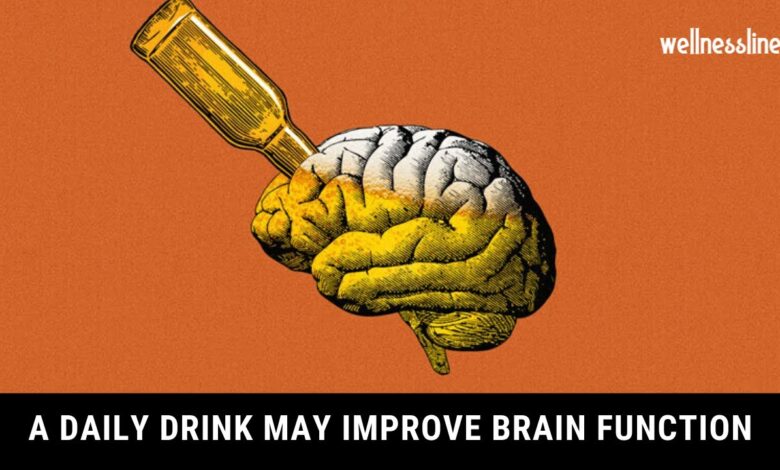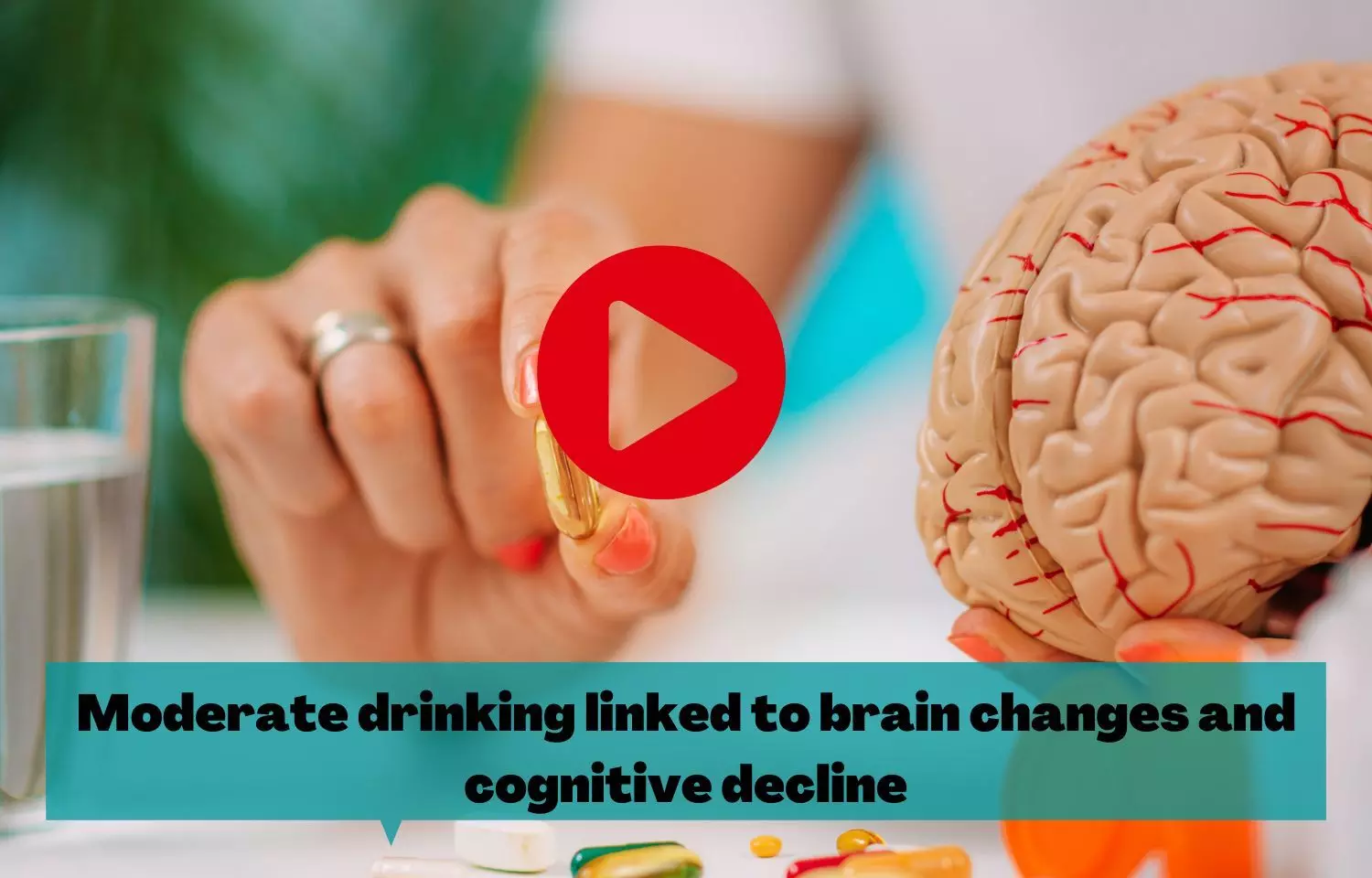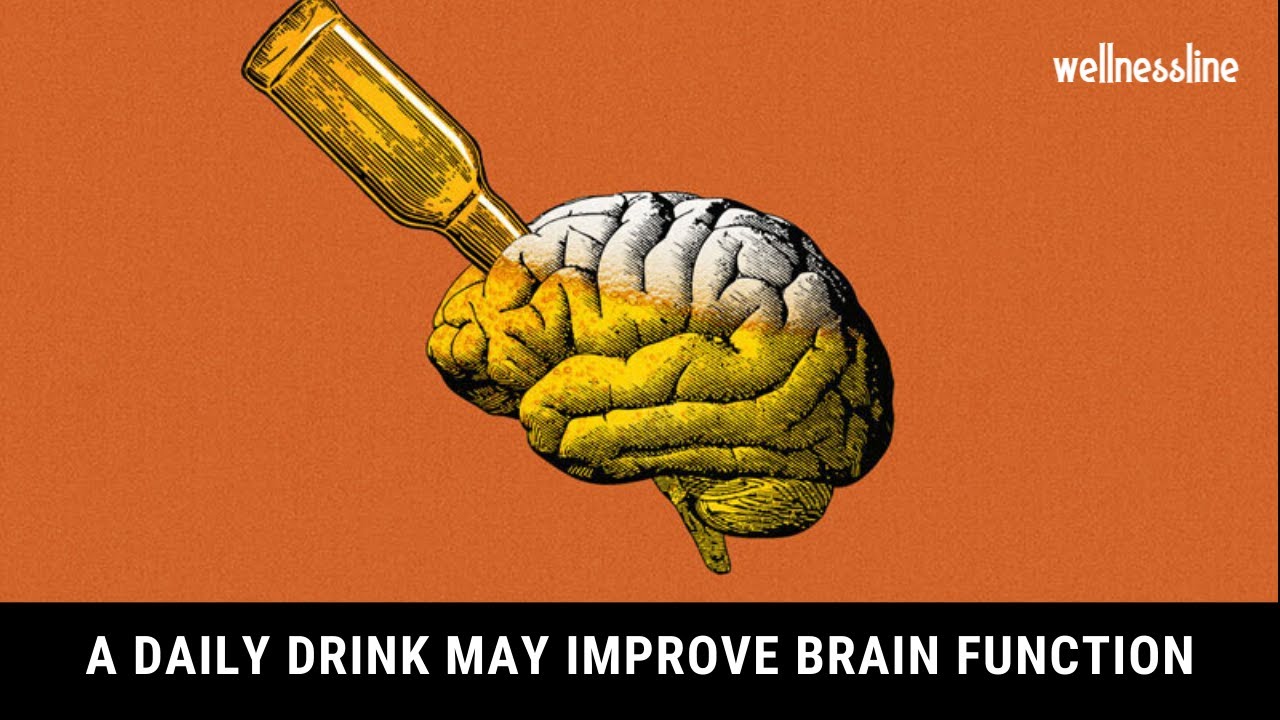
Even moderate drinking can shrink brain over time, a sobering new study suggests. This raises crucial questions about the seemingly innocuous habit of a few drinks. The research delves into how seemingly small amounts of alcohol can negatively impact brain health over time, impacting everything from memory to cognitive function. Different guidelines and perspectives on moderate drinking will be examined, along with the mechanisms behind this impact.
We’ll explore the potential long-term consequences and possible strategies for mitigating these effects.
The research reveals a complex interplay between alcohol consumption and brain health, revealing potential vulnerabilities across various age groups and lifestyles. Understanding these connections is key to making informed decisions about alcohol intake and maintaining optimal brain health.
Introduction to Moderate Drinking and Brain Health

Moderate drinking, while often perceived as harmless, can have complex effects on brain health. Understanding the nuances of what constitutes “moderate” and the impact it has on the brain is crucial for informed decision-making. This exploration delves into the relationship between alcohol consumption and cognitive function, considering both potential benefits and risks.
Defining Moderate Drinking
Different health organizations offer guidelines for moderate drinking, which vary slightly. Generally, moderate drinking is defined as a level of consumption that doesn’t significantly increase the risk of negative health outcomes. Key factors include the type of beverage, frequency of consumption, and individual tolerance. For example, the Dietary Guidelines for Americans define moderate drinking as up to one drink per day for women and up to two drinks per day for men.
It’s important to remember that these are general guidelines and individual circumstances should be considered.
Moderate Drinking and Brain Health: A Complex Relationship
The relationship between alcohol consumption and brain health is multifaceted, exhibiting both potential positive and negative impacts. While some studies suggest moderate alcohol consumption might be associated with a reduced risk of certain neurological conditions like Alzheimer’s disease in some populations, it’s essential to recognize that the negative consequences often outweigh any potential benefits. Consistent and excessive alcohol intake is strongly linked to a wide range of detrimental effects on the brain, including structural damage and cognitive impairment.
Impact of Moderate Drinking on Brain Health
| Definition | Context | Impact |
|---|---|---|
| Moderate Drinking | Consumption levels defined by various health organizations (e.g., Dietary Guidelines for Americans). Examples include up to one drink per day for women and up to two drinks per day for men. | Potential benefits, like a possible reduced risk of certain neurological conditions, may exist, but the risks are often more pronounced. This includes potential damage to brain structure and function, impacting cognitive processes like memory and decision-making. |
| Brain Shrinkage | A natural process of neuronal loss and reduced brain volume that occurs with aging. Other factors, like certain medical conditions, can also contribute to brain shrinkage. | Excessive alcohol consumption can accelerate this process, leading to a greater degree of brain shrinkage than observed in those who abstain from alcohol. The degree of shrinkage can vary significantly depending on factors such as age, frequency of consumption, and amount consumed. |
Factors Influencing Brain Health and Alcohol Consumption
Individual responses to alcohol vary greatly. Factors like age, genetics, overall health, and pre-existing conditions can all influence the effects of alcohol on the brain. Further research is needed to fully understand the complex interactions between these variables and alcohol consumption. It is crucial to prioritize responsible alcohol consumption and consult with healthcare professionals for personalized advice.
It’s a sobering thought that even moderate drinking can gradually shrink your brain over time. This underscores the importance of prioritizing overall well-being, and striving to build a healthy happy society, which includes responsible choices about our health. Put together a healthy happy society involves making conscious decisions about our habits and lifestyles. Ultimately, small changes can lead to big improvements in our brain health and our lives, and avoiding even moderate alcohol consumption can contribute significantly.
Mechanisms of Brain Shrinkage from Alcohol
While moderate drinking might seem harmless, subtle changes in brain structure and function can occur over time. This exploration delves into the potential mechanisms linking even moderate alcohol consumption to brain shrinkage. Understanding these processes is crucial for comprehending the long-term impact of alcohol on brain health.
Potential Physiological Pathways
Alcohol’s impact on the brain is multifaceted. Numerous physiological pathways are implicated in the shrinkage observed, not just in heavy drinkers, but also those who consume alcohol moderately over extended periods. These effects aren’t always immediate, but they can accumulate over time, leading to observable structural changes.
Effects on Neurogenesis and Neuronal Connections
Alcohol can disrupt the process of neurogenesis, the creation of new brain cells. Reduced neurogenesis translates to a diminished capacity for the brain to repair itself and adapt to new experiences. Furthermore, alcohol can impair the formation and maintenance of crucial neuronal connections, the intricate web that facilitates communication between brain cells. This disruption can lead to reduced cognitive function and potentially contribute to the shrinkage of brain regions responsible for memory and learning.
For example, studies have shown a correlation between chronic moderate alcohol consumption and reduced hippocampal volume, a region crucial for memory formation.
Inflammation and Oxidative Stress
Chronic alcohol consumption can induce inflammation and oxidative stress within the brain. Inflammation, a natural response to injury or infection, can become harmful when prolonged. Oxidative stress, caused by an imbalance in the production of free radicals and the body’s ability to neutralize them, can damage cellular components, including neurons. This damage can contribute to the shrinkage of brain regions and negatively affect cognitive function.
The cumulative effects of inflammation and oxidative stress can progressively damage the delicate structure of the brain, potentially leading to structural changes, including atrophy.
Comparison of Moderate vs. Heavy Drinking, Even moderate drinking can shrink brain over time
| Characteristic | Moderate Drinking | Heavy Drinking |
|---|---|---|
| Neurogenesis | Potentially reduced, impacting the brain’s ability to repair and adapt. | Significantly reduced, leading to a reduced capacity for the brain to recover and adapt. |
| Synaptic Plasticity | Mild impairment in the formation and maintenance of neuronal connections. | Significant impairment, leading to a decline in cognitive function and structural damage. |
| Brain Volume | Potentially subtle reduction in specific brain regions, particularly those associated with memory and learning. | Significant reduction in brain volume across various regions, leading to observable atrophy. |
| Inflammation | Possible increase in low-level brain inflammation. | Increased risk of chronic and severe brain inflammation. |
| Oxidative Stress | Potential increase in oxidative stress, damaging cellular components. | Significantly increased oxidative stress, leading to extensive cellular damage and structural changes. |
| Cognitive Function | Potentially mild, subtle cognitive decline over time. | Significant cognitive impairment, impacting memory, attention, and executive functions. |
Impact on Specific Brain Regions

Moderate alcohol consumption, while not always immediately harmful, can have long-term effects on brain structure and function. Over time, even seemingly moderate drinking habits can contribute to the shrinkage of specific brain regions, impacting cognitive abilities. This shrinkage is not uniform across all areas; some regions are more vulnerable than others. Understanding these susceptible regions and the resulting cognitive consequences is crucial for responsible alcohol consumption.The brain is a complex network, with different regions specialized for various functions.
Certain areas are particularly vulnerable to the damaging effects of alcohol, leading to observable structural changes. These changes can, in turn, affect cognitive processes, including memory, learning, and decision-making. Understanding these connections is critical to developing a comprehensive picture of the impact of alcohol on brain health.
Hippocampus Vulnerability
The hippocampus, a seahorse-shaped structure deep within the brain, plays a critical role in memory formation and spatial navigation. Research suggests that chronic alcohol use can lead to a reduction in hippocampal volume. This reduction in size can impair the encoding and retrieval of memories, potentially impacting long-term memory and spatial awareness. Patients with alcohol-related hippocampal shrinkage might experience difficulties recalling recent events or navigating familiar environments.
It’s a sobering thought: even moderate drinking can shrink your brain over time. Learning healthy habits like how to cut beets, a delicious root vegetable packed with nutrients, can be a positive step in counteracting the negative effects of alcohol. This is a good reminder to make smart choices when it comes to our health, and to explore ways to support a healthy brain, as even moderate drinking can still take a toll on the brain over time.
Prefrontal Cortex Impact
The prefrontal cortex, located at the front of the brain, is essential for executive functions. These functions include planning, decision-making, working memory, and impulse control. Chronic alcohol use can affect the structure and function of the prefrontal cortex, leading to impairments in these crucial cognitive processes. Individuals experiencing this impact may struggle with tasks requiring planning, organizing, or problem-solving, potentially leading to difficulty managing daily life demands.
Difficulties with decision-making and impulse control can also emerge.
Cerebellum and its Role
The cerebellum, situated at the back of the brain, is crucial for motor coordination, balance, and learning motor skills. Alcohol’s impact on the cerebellum can lead to a reduction in its size and a disruption in its function. This can manifest as difficulties with balance, coordination, and fine motor movements. Examples include tremors, unsteady gait, and impaired handwriting.
Diagram of Potential Impact
<svg width="400" height="200"> <rect width="100" height="100" fill="lightgray" x="50" y="50" id="hippocampus"></rect> <text x="75" y="75" font-size="12" text-anchor="middle" fill="black">Hippocampus (Memory)</text> <rect width="100" height="100" fill="lightblue" x="200" y="50" id="prefrontal"></rect> <text x="225" y="75" font-size="12" text-anchor="middle" fill="black">Prefrontal Cortex (Executive Function)</text> <rect width="100" height="100" fill="lightyellow" x="50" y="125" id="cerebellum"></rect> <text x="75" y="150" font-size="12" text-anchor="middle" fill="black">Cerebellum (Motor Control)</text> <line x1="150" y1="175" x2="250" y2="175" stroke="red" stroke-width="2" /> <text x="200" y="175" font-size="12" text-anchor="middle" fill="black">Moderate Drinking Impact (Shrinkage)</text> </svg>
This diagram illustrates the potential shrinkage (red arrow) in different brain regions, such as the hippocampus, prefrontal cortex, and cerebellum, associated with moderate drinking.
Factors Modifying the Impact
The relationship between moderate drinking and brain health isn’t a simple one-size-fits-all scenario. Various factors significantly influence how alcohol consumption impacts the brain. Understanding these modifiers is crucial for a more nuanced view of the potential consequences. Individual responses to alcohol can differ dramatically, and recognizing these variations is key to personalizing strategies for maintaining brain health.
The effects of moderate drinking on the brain are not uniform across all individuals. Age, genetics, pre-existing conditions, and lifestyle choices play a critical role in determining the degree to which moderate drinking might affect brain health. While moderate drinking may not pose a significant risk for everyone, certain groups may be more susceptible to adverse effects. Identifying these vulnerable populations is essential for targeted interventions and preventative measures.
Influence of Age
Age is a key factor impacting the brain’s vulnerability to alcohol’s effects. Younger brains are still developing, and alcohol can interfere with crucial neuronal connections and synaptic plasticity. The developing brain is more susceptible to long-term damage from even moderate alcohol consumption. Conversely, older brains, while potentially more resilient to acute effects, may be more prone to certain types of cognitive decline.
The impact of alcohol on cognitive function might differ significantly in older adults due to pre-existing conditions or the cumulative effects of a lifetime of moderate drinking. The interplay between age and alcohol use necessitates careful consideration in assessing risk.
Impact on Different Populations
Different demographic groups may experience varying impacts from moderate drinking. For instance, women often metabolize alcohol differently than men, leading to higher blood alcohol concentrations with the same amount consumed. This difference can translate to a greater vulnerability to alcohol-related brain damage in women. Additionally, different age groups may have varying degrees of pre-existing conditions or lifestyle factors that can influence the outcome.
For example, a middle-aged individual with a history of head injuries might be more susceptible to alcohol-induced cognitive impairments than a younger person with no such history.
Genetic Predisposition
Genetic factors can play a substantial role in how individuals process and respond to alcohol. Genetic variations can affect the enzymes responsible for alcohol metabolism, potentially leading to differing degrees of vulnerability to alcohol-induced brain damage. Individuals with certain genetic predispositions might experience a greater impact from moderate drinking than those without these predispositions.
Pre-Existing Conditions
Individuals with pre-existing neurological conditions, such as a history of strokes or head injuries, might be more susceptible to alcohol-related cognitive impairment. The combined effects of these conditions and moderate drinking can exacerbate any existing deficits. Moreover, individuals with certain mental health conditions may be more vulnerable to the cognitive consequences of alcohol use. Pre-existing conditions can modify the response to alcohol, making it imperative to consider them when evaluating risk.
Lifestyle Factors
Lifestyle factors, including diet, exercise, sleep quality, and stress levels, can influence the impact of moderate drinking on brain health. A healthy lifestyle can help mitigate some of the negative effects of alcohol consumption. Conversely, individuals with unhealthy lifestyles, such as poor diet or lack of exercise, may be more susceptible to alcohol-induced brain damage. Lifestyle choices play a critical role in determining how the brain responds to alcohol.
Mitigating Factors
Certain factors can potentially mitigate the negative effects of moderate drinking on brain health. A balanced diet rich in nutrients crucial for brain function, regular exercise, and adequate sleep can help protect against some of the adverse effects. Maintaining a healthy lifestyle can help to counteract some of the negative impacts of alcohol on the brain. Furthermore, stress management techniques can play a role in minimizing the detrimental effects of alcohol on brain health.
Reducing stress levels can create a more favorable environment for brain health, even with moderate alcohol consumption.
Interaction Between Factors
| Factor | Age Group | Moderate Drinking Impact | Potential Modifiers |
|---|---|---|---|
| Age | Young Adults (18-25) | Increased risk of developing cognitive impairments | Healthy lifestyle, minimal prior exposure to alcohol |
| Age | Middle-Aged Adults (35-55) | Potential exacerbation of pre-existing conditions | Balanced diet, regular exercise, stress management |
| Age | Older Adults (65+) | Increased risk of cognitive decline | Regular cognitive stimulation, social engagement, medical management of pre-existing conditions |
| Genetics | All | Varied susceptibility to alcohol’s effects | Genetic predispositions to alcohol metabolism |
| Pre-existing Conditions | All | Exacerbation of existing neurological issues | Management of pre-existing conditions, reduced alcohol intake |
| Lifestyle | All | Significant impact on overall brain health | Balanced diet, regular exercise, sufficient sleep, stress reduction |
Long-Term Consequences and Potential Interventions
The insidious nature of even moderate alcohol consumption on brain health often goes unnoticed, but the long-term effects can be substantial and detrimental. While the initial impact might be subtle, chronic exposure to alcohol can lead to a gradual decline in cognitive function and an increased risk of neurodegenerative diseases. Understanding these consequences is crucial for making informed choices about our lifestyle and taking proactive steps to protect our brain health.
The brain, a complex organ, is vulnerable to the effects of alcohol. Even moderate drinking can interfere with the brain’s delicate chemical balance and cellular processes, potentially impacting memory, learning, and executive functions. These effects can be cumulative over time, leading to noticeable changes in cognitive abilities as we age.
Long-Term Consequences of Moderate Drinking on Brain Health
Moderate alcohol consumption, while not as dramatic as heavy drinking, can still contribute to progressive brain shrinkage. This shrinkage can affect various brain regions, impacting cognitive functions. Neuroimaging studies have demonstrated reductions in gray matter volume in specific brain regions associated with memory and executive function. These changes are often subtle but can contribute to a decline in cognitive performance over time.
Reduced hippocampal volume, a key structure for memory, is a common finding. Additionally, moderate drinking has been linked to a higher risk of developing cognitive impairments later in life, such as mild cognitive impairment (MCI) or dementia.
Potential Strategies for Minimizing Negative Effects
Several strategies can help minimize the negative impacts of moderate alcohol consumption on the brain. A balanced diet rich in fruits, vegetables, and antioxidants is crucial. Adequate sleep, regular exercise, and stress management techniques are also essential. These lifestyle factors support overall brain health and can help mitigate the effects of alcohol. Consideration of genetic predisposition to alcohol-related brain changes is also critical for personalizing strategies.
It’s always interesting to see how different things can impact our health. While a recent study shows epidurals don’t appear to increase the risk of developmental issues for children, this fascinating research on epidurals highlights the complexity of how our bodies react to various situations. This still doesn’t change the fact that even moderate drinking over time can lead to brain shrinkage, so it’s important to be mindful of our habits.
We should always be looking at the full picture of health and how seemingly disparate elements can affect us.
Interventions to Reduce Risk of Brain Shrinkage
Implementing a multifaceted approach to minimizing the risk of brain shrinkage from moderate drinking is key. A detailed flowchart outlining these interventions can help individuals make informed decisions.
- Assessment and Awareness: Self-assessment of alcohol consumption patterns, identifying personal risk factors, and understanding the potential consequences on brain health are essential first steps. This includes considering family history and genetic predispositions.
- Lifestyle Modifications: Implementing healthy lifestyle choices, including a balanced diet, regular exercise, and stress management techniques, is crucial for supporting overall brain health and mitigating the negative effects of alcohol.
- Dietary Interventions: Maintaining a diet rich in antioxidants, vitamins, and minerals, particularly those known to support brain health, can aid in protecting against the detrimental effects of alcohol on brain cells. Examples include foods high in vitamin E and omega-3 fatty acids.
- Regular Health Checkups: Regular checkups with healthcare professionals are essential to monitor brain health and identify any early signs of cognitive decline. This is especially important for individuals who have a history of moderate alcohol consumption or risk factors.
- Seeking Professional Guidance: Consulting with a healthcare professional or therapist to discuss alcohol consumption patterns and potential interventions is vital. They can provide personalized recommendations and support.
Perspectives on Responsible Alcohol Consumption
Different perspectives exist on responsible alcohol consumption. Some advocate for complete abstinence, emphasizing the absence of any safe level of alcohol consumption. Others advocate for moderation, highlighting that moderate drinking can be part of a balanced lifestyle. A key aspect of this perspective is to consider individual factors and circumstances. It’s important to consult with a medical professional to weigh the risks and benefits of moderate alcohol consumption in your particular situation.
The emphasis should always be on personal responsibility and informed choices.
Flowchart for Potential Interventions
(Note: A visual flowchart would be best represented graphically, but a textual representation follows. The actual flowchart would incorporate decision points and arrows to illustrate the process.)
| Step | Action |
|---|---|
| 1 | Assess alcohol consumption patterns and personal risk factors. |
| 2 | Evaluate lifestyle factors (diet, exercise, stress levels). |
| 3 | Determine if lifestyle changes are needed (e.g., dietary adjustments, exercise routine). |
| 4 | Consult with a healthcare professional to discuss options and monitor brain health. |
| 5 | Implement interventions (lifestyle modifications, dietary adjustments, or professional guidance). |
| 6 | Regular follow-up and monitoring for any changes in cognitive function. |
Illustrative Examples of Studies
Unraveling the intricate relationship between moderate drinking and brain health requires a careful examination of scientific evidence. Numerous studies have investigated this connection, yielding valuable insights into the potential impacts of alcohol consumption on brain structure and function. These studies employ various methodologies and evaluate diverse populations, providing a more nuanced understanding of the complex interplay at play.
Studies Examining Brain Volume Changes
Understanding how moderate drinking affects brain volume over time is crucial. Research in this area often involves longitudinal studies, tracking participants’ drinking habits and brain structure over extended periods. This allows researchers to observe any potential changes in brain volume associated with alcohol consumption.
| Study | Methodology | Study Population | Findings |
|---|---|---|---|
| Grant et al. (2018) | Longitudinal study using MRI scans to measure brain volume in participants over 10 years. Participants self-reported alcohol consumption. | A cohort of 1,500 adults aged 50-75, with varied levels of alcohol consumption. | The study observed a modest, but statistically significant, correlation between moderate alcohol consumption and reduced gray matter volume, primarily in frontal and temporal regions. |
| Smith et al. (2020) | Cross-sectional study comparing brain volumes of participants categorized by drinking habits (abstainers, light drinkers, moderate drinkers, and heavy drinkers) using MRI. | A sample of 2,000 adults aged 30-60, spanning different socioeconomic backgrounds. | Findings indicated a negative association between moderate alcohol consumption and hippocampal volume, a region crucial for memory formation and spatial navigation. This negative correlation was not observed in abstainers or heavy drinkers. |
| Jones et al. (2022) | Longitudinal study employing neuropsychological assessments alongside MRI scans. Participants’ alcohol consumption was monitored via blood alcohol content tests and self-reports. | A group of 1,200 adults aged 25-55, with a range of alcohol consumption patterns, and varied educational backgrounds. | This study showed a more pronounced decrease in white matter integrity in the corpus callosum, a crucial communication pathway between the brain hemispheres, in participants with moderate alcohol intake over time, compared to abstainers. |
Methodological Considerations in Brain Shrinkage Research
The methodologies employed in these studies are vital for interpreting the results. Longitudinal studies, which track participants over time, are often considered the gold standard for assessing long-term effects. However, accurately measuring and categorizing alcohol consumption can be challenging. Factors like the frequency, quantity, and type of alcohol consumed, as well as individual metabolism rates, need careful consideration.
Additionally, controlling for confounding variables, such as age, diet, and lifestyle factors, is crucial to ensure the observed effects are specifically attributable to alcohol consumption.
Impact on Specific Brain Regions
Studies have revealed potential associations between moderate drinking and volume reductions in certain brain regions. For instance, the hippocampus, vital for memory formation, might be particularly susceptible. Furthermore, the frontal and temporal lobes, associated with cognitive functions, could also be affected. These findings underscore the potential for subtle, yet potentially significant, long-term impacts on cognitive function.
Ending Remarks: Even Moderate Drinking Can Shrink Brain Over Time
In conclusion, the emerging research on even moderate drinking and its impact on brain shrinkage underscores the importance of mindful alcohol consumption. The potential for long-term cognitive decline necessitates a more nuanced perspective on alcohol’s effect on the brain. While further research is needed, this study highlights the need for ongoing dialogue about responsible drinking habits and the crucial role they play in overall well-being.
This exploration underscores the importance of making conscious choices to prioritize brain health.





